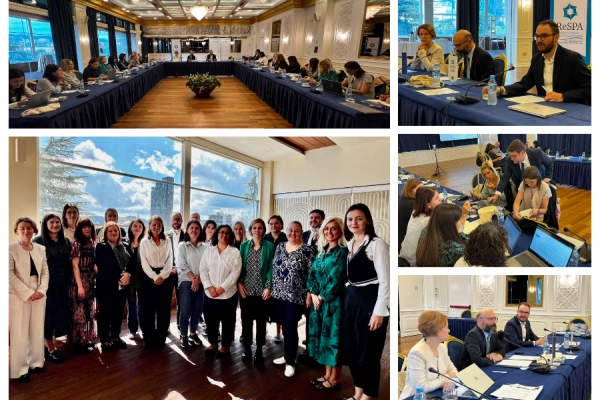
Strategic communication for EU Integration: ReSPA and Hertie School deliver joint executive programme
Tirana, 30 September – 1 October 2025
Public servants from across the Western Balkans gathered in Tirana for the Executive Education programme “Strategic Communication for EU Integration”, jointly delivered by ReSPA and the Hertie School. Over the course of two days, participants explored how to communicate EU reforms credibly, build trust among citizens, and enhance institutional resilience against disinformation. The event combined expert lectures, real-time and interactive simulations as well as peer exchange.
The training came at a particularly relevant moment, since strategic communication is now a key element of the enlargement process: it helps governments explain reforms, manage expectations, and prevent the spread of misinformation and polarisation.
In his keynote remarks, Andre Rizzo, Head of European Integration at the EU Delegation to Albania, highlighted that communicating the EU to the general public is essential not only to explain reforms but also to counter disinformation and manipulation. His message set the tone for two days of intensive learning, exchange and practice.
The first day, led by Marija Golubeva, Henrik Enderlein Fellow at the Hertie School and former Minister of Interior of Latvia, focused on how to make EU topics meaningful to citizens. Through a mix of case studies, group discussions and hands-on exercises, participants examined how to frame complex reforms in ways that resonate with different audiences. A scenario-based crisis communication simulation placed them in the role of a Ministry of Justice facing public backlash against a reform, forcing them to respond quickly to journalists’ requests and social media pressure. The day concluded with an exercise on how to craft reform narratives that emphasise concrete benefits and connect to people’s daily lives.
On the second day, Adnan Ćerimagić, Senior Analyst at the European Stability Initiative Berlin, turned attention to the political and practical challenges of communication. Drawing on recent Eurobarometer data, he showed how public support for enlargement fluctuates and why governments must balance honesty about challenges with clear explanations of benefits. Participants then worked in groups to design communication strategies for sensitive reform milestones and presented their approaches in a lively plenary debate. The final session focused on how to counter disinformation, with practical examples from the region and beyond on building institutional resilience and promoting fact-based communication.
Throughout the programme, participants shared experiences from their administrations, tested different approaches to complex communication challenges, and reflected on how to coordinate messages across government institutions better. The closing session reinforced the idea that communication is not an accessory to reforms, but a crucial element of their success.
Reflecting on the event, ReSPA Programme Coordinator Genti Xhaxhiu underlined that “ReSPA is committed to strengthening the capacities of public administrations in the Western Balkans on EU integration matters, ensuring that institutions not only deliver reforms but also communicate them in ways that build trust and resilience.”
The training concluded with high recognition of the fruitful partnership between ReSPA and the Hertie School, marked by the awarding of joint ReSPA–Hertie Executive Certificates



